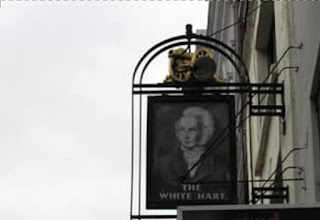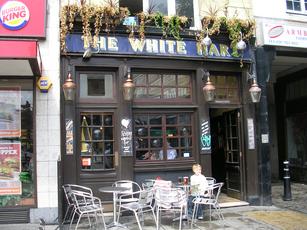 |
| Haworth is just unbelievably beautiful ... and it's Bronte country! |
One of my lifelong dreams was to visit where the Bronte sisters lived and died (for the most part; Anne died at the seaside). So when I headed to London with Mr. G. last summer, I worked out how to reach Haworth - AKA Bronte Country - in north England. Then I told Mr. G. it was very convenient to London (it's not) and would be absolutely no trouble to reach (it's not) and that we would stay overnight in an actual pub (winner winner, chicken dinner).
This is where Mr. G. is just an absolutely wonderful sport (and a big part of the reason I love him). He's never read a Bronte novel in his life. But I told him that we would stay in an actual pub and see the moors, and he was in. Then he so immersed himself in the outing that he developed an intense dislike of poor Branwell Bronte.
 |
| From the hustle and bustle of London, we were off to the English countryside. |
Our journey started at King's Cross, where we felt very much like Harry Potter. Alas, the trains are sleek and modern - in other words, nothing like the quaint individual compartments of Harry Potter. I booked the evening train so we could squeeze as much out of London as possible during the day before heading north for the final leg of our visit. However, we had enough sunlight to see a glorious rainbow. It was a sign. We quite enjoyed Yorkshire. It was relaxed and friendly compared to the congestion and sophistication of London. In other words, it was much more our speed.
We got to Leeds, turned the wrong way on the platform and were turned around in the right direction by a friendly train attendant with a Scottish accent so thick that we just squinted at her in confusion. Finally, we caught the Keighley train (far smaller and less posh than the previous train) and found a taxi to Haworth. It was very much an adventure.
By the way, Keighley is pronounced Keith-lee. Haworth is Ho-worth.
In my mind, the Brontes lived in a lonely parsonage on the wind-swept moors. They, in fact, lived in a tiny town. They were villagers, not rural farmers. The parsonage is just back of the main drag with a lovely view of the graveyard. Death was very present in the lives of the Brontes.
 |
| We were quite comfortable at The Old White Lion. It has a bar and a lounge right out of "Fawlty Towers." |
Our inn/pub was The Old White Lion. It's at the top of a very steep street, and it's a 300-year-old coaching inn. I knew the age of the place would appeal to Glenn. In fact, he loved the entire vibe. We
 |
| Glenn came to Yorkshire hoping for this. |
stepped in, close to midnight, and found a group of older locals drinking in the bar. They immediately welcomed us into their conversation before calling taxis to ferry them home. Glenn insisted - with much glee - that the bartender was like someone out of "An American Werewolf in London," but I think he was just hoping. Glenn was in his element: Beer, friendly conversation and a cranky bartender.
The next day, we tried and rejected the English breakfast. I just can't cotton to kippers and stewed tomatoes. Then we strolled up the cobblestone main street of Haworth. Everything screams Bronte, from the names of the shops to the multitude of pubs that Branwell Bronte frequented.
 |
| The Bronte influence is everywhere! |
I filled in Mr. G. on Branwell while we walked and widow-shopped. Branwell was the only boy in a family of girls who would become lionesses in the literary world. You know, of course, that the girls grew up to publish "Wuthering Heights," "Jane Eyre," etc. The children grew up amid great sorrow (a mother who died young of cancer, horrific boarding school conditions and two sisters who died from those horrific boarding school conditions), not to mention the ever present knowledge that they would be cast onto the street when their father died and the parsonage went to the next preacher and his family. Ironically, the Rev. Bronte outlived every single one of his children.
Branwell was supposed to be the family's saving grace. With his sisters, he created elaborate stories about his toy soldiers when he was just a boy. He was wildly creative and incredibly sensitive. It's not a good mix. Branwell turned into a wastrel who got mixed up with a married woman and descended into the drink. That married woman's name was Mrs. Robinson. Coo coo c'hoo.
 |
| Branwell Bronte drank here ... |
The way my mother told the story, the girls hid their own talent and published under fake names because the family was supposed to be pulling together to launch Branwell as an artistic genius. It's clear that Branwell was a disaster who wasted any money and effort his family invested in him. Every pub in Haworth seems to have a sign that proclaims Branwell once drank there. It's no great wonder that he died in his early 30s.
Today, Branwell is famous for his wasted life and for his artwork that hangs in the National Gallery. The painting is of his sisters. In a fit of who-knows-what, Branwell erased his own image from the painting. It's just as well. It's the girls who left the lasting legacy.
 |
| And here ... |
We went through the parsonage, which remains much as it did in the Brontes' time, downstairs, at least. Upstairs, Charlotte's bedroom was bare of furniture as was the small bedroom that Anne and Emily once
 |
| Branwell left us this at least. |
shared. Branwell's room, though, was dressed up with the furniture and knickknacks from the set of a recent movie on the Brontes. It was so realistic - not at all tidy but cluttered with drawings and books - that Branwell could have left the bedroom just five minutes prior, likely to pop into the pub. Mr. G. sniffed with distaste at the amount of attention devoted to Branwell.
We wandered through an addition to the parsonage which contained tons of things that belonged to the Brontes, including their dogs' collars. Then it was down the stairs to a special exhibit on Branwell's artwork.
Mr. G. wandered into the exhibit and walked swiftly out. "Why does he get an exhibit? His sisters are the ones who actually accomplished something" he angrily said.
Sorry, Branwell.
NEXT: We nearly die among the sheep poop to walk in the steps of the Brontes (except Branwell; he stayed home and drank).















